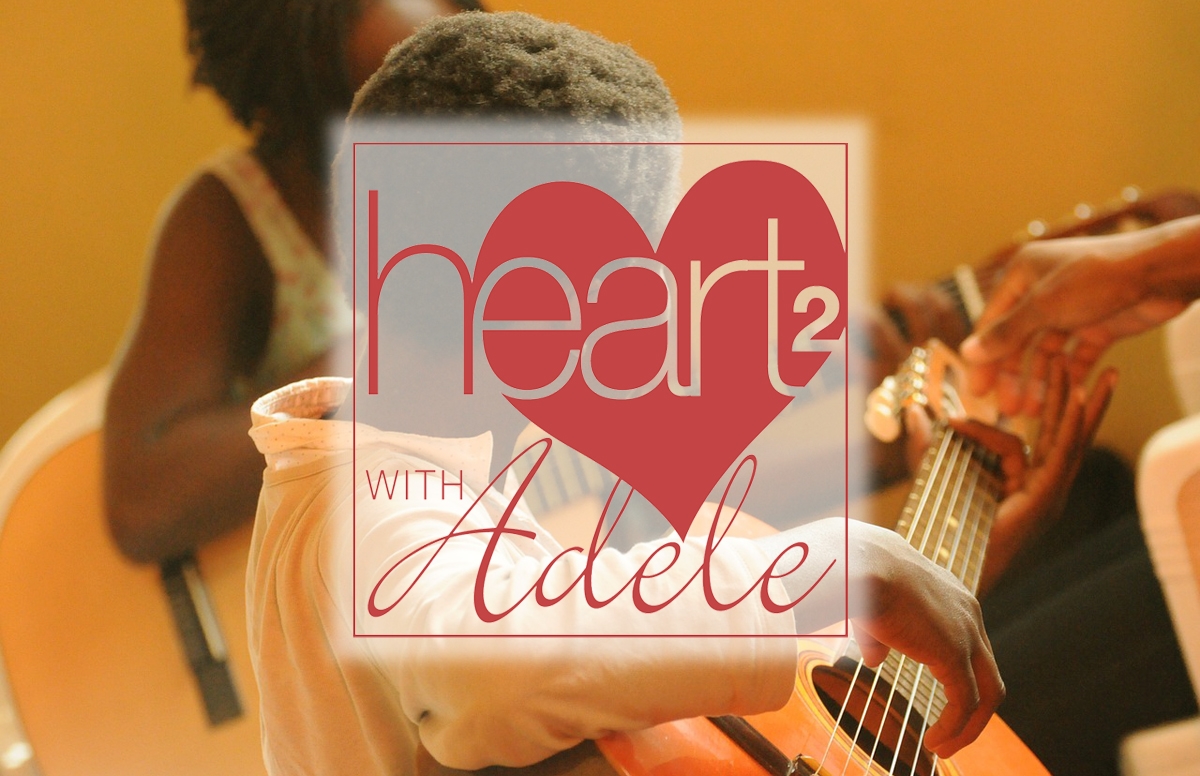
Heart to Heart: How Covid-19 can strengthen your family
Question
Heart to heart with Adele- How Covid-19 can strengthen your family!
Dear Adele,
The Coronavirus pandemic is frightening us greatly. My husband and I have been glued to the television set all day and all night for weeks, switching from channel to channel, trying to understand the magnitude of a virus that has the capacity to take out masses of people! The virus, it seems, is like the wind, touching people everywhere. We are being told to stay home, stop the spread, and save lives. We are however, still panicked. We feel like total incompetents in knowing how to handle this unprecedented life experience and parenting challenge. We want to know how to help our children, and ourselves if truth be told, to get through it. We welcome any advice you might have.
Parents who are climbing the Covid-19 Alps, without a Sherpa
Answer
Dear Parents who are climbing the Covid-19 Alps, without a Sherpa,
Adversity is a funny thing. We all seek to avoid it in life. We all try to protect our children from having to face it. We all want our leaders to make sure that as little as possible adversity comes our way. And yet it is a mighty teacher for all of us, especially for our children.
The current adversity of Covid-19, tearing the fabric of our entire world into shreds, began a few months ago in China. All kinds of theories, explanations, and ideas about the source of the coronavirus have been suggested. We may never know for sure, exactly how it began.
The one thing that all of us do know for certain, is that it is an unprecedented world health problem that needs management and control. What we need to do, regardless of our opinions and ideas about the source, is to approach this adversity in the best way possible, keep our families healthy and alive, and model for our children how to handle any future adversity they will face in life. That is your role parents and I have a few ideas for you which hopefully will be helpful.
The first thing to do is to keep up with the advice and suggestions for containing the virus that the world leaders whom we trust, are providing for us and which is generally available on mainstream media sources on television, radio stations, and print media, such as major magazines and local and national newspapers. Online versions, are also doing their best to keep us well-informed. Try to access many sources of information for yourself and your family, so that you are as current and informed as possible about the status of the virus, and what you can do to stop the spread. Most quality media sources want to do an excellent job of informing us on this subject no matter their political bias.
The bottom line that seems to be the best strategy to contain the virus worldwide is to ask everyone to stay home. Stay home, stop the spread, and save lives by social distancing. Justin Trudeau, our Canadian Prime Minister says that is our duty.
Many parents are doing that, but are wondering what to do with the impact of this on their children. My ideas for you will have all kinds of benefits I think, for your family, and for our society in general, if people give them consideration and actually try to follow most of them. These ideas were actually pretty much inspired by a program developed in Iceland, that was incredibly effective in virtually eliminating their out-of-control drug problem, in the 90s. The program was so impressive, it spread to many countries in Europe, and was considered by the White House, in the U.S. Not only did it save the lives of all kinds of adolescents who might’ve overdosed on drugs, or impact those who might have become involved with drugs, changing their futures and seeing them veer off the main highway, it had an amazing byproduct to it. It ushered in the return of more positive traditional values, stronger family life, improved communications between parents and children, better physical health, better mental health, and better emotional health for every single member of the society.
So here are my suggestions for handling your children at home.
Be calm. Be relaxed. Be proactive. Be knowledgeable. Be the kind of leader that elicits feelings of trust and confidence from your children.
Talk to your children about things one can control, and things that one cannot control. Suggest to them that in any adverse situation one must look at the things one can control rationally and calmly, find out what the best strategies to control those things are, and then put them in place and carry them out. Teach them that worry is futile about anything. Fearing what you cannot control, stressing out about what you cannot control, letting your blood pressure rise over things you cannot control, complaining about what you cannot control, fighting about what you cannot control, or allowing yourself any negative reaction emotionally about things which you cannot control, is an utter waste of time and totally the wrong way to deal with any adversity, including this one.
It has been said that a parent should not ruin their children by protecting them from adversity. Teaching children how to deal with adversity, allowing them to experience it while growing up and letting them practice how to deal with it positively, are most valuable learning opportunities. They help any child get ready for the adult life ahead, which is bound to be full of adversity, hills and mountains, twists and turns, ups and downs, and detours off the main highway on life’s journey. Involve all of your children therefore, no matter their age, in discussions about this world adversity, help them understand and contribute to the family reaction to it, and gain everyone’s cooperation through discussion, about how your family is going to deal with it.
Once you have your family on board, you need to plan for how everyone will spend their time. Once again, a family discussion should ensue. That being said, you parents are the leaders in your family, and it is your job to make sure that your children stay healthy, get enough sleep and rest, continue advancing in their education as much is possible, get enough physical exercise, and develop the values that you believe in, and the values that our society needs your children to develop for the future as Canadian citizens. While the children should be involved in planning how the time for everyone will be spent each day, while all of us are staying at home, you must be satisfied with the way your children are spending their time. It is your job to ensure that it happens.
You can do it parents. It is not rocket science. And your children will benefit from it.
I suggest that a daily plan for the children and teenagers with a consistent routine be created and followed. Children behave and function much better that way. With such a routine in place, you will not be tearing your hair out trying to manage them or wonder how much longer you can survive with unruly children and teenagers running the show, while you are all cooped up together in your home. I am already reading on parenting sites in this community, about parents who are running on fumes and who cannot imagine how our teachers manage 25 or 30 kids each and every day. They are discovering what an incredible challenge it is, to stay patient while keeping only their own two or three kids productively busy and active, within the constraints imposed upon families, during this coronavirus pandemic. Now that is a positive outcome going forward, for our Ontario teachers, I would say.
I suggest the routine be written and posted, so everyone is absolutely clear about expectations. It should include the time everyone will rise, the morning routine for self-care, and the expected time the children and teenagers will be at the dining room table, ready for a three-hour morning of school work. You might want to include the singing of O Canada, and a prayer that reflects your beliefs and values.
Now, before you say you will never be able to enforce that, or that you are not teachers and cannot educate your children, I have complete confidence that you absolutely will be able to enforce that and that your children might have the best possible schooling experience of their lives, right at home, at your dining room table, with you leading and directing their learning. This is your chance to take charge of your children and your home, and to see firsthand exactly the deficiencies in your children’s learning, which you may previously have been completely unaware of. This is your chance to get them excited about learning and to share your own excitement about things you have learned and things you want to learn about.
You don’t need a college or university education, to help your elementary school child read to you and for you to see that he cannot decode certain words or that he cannot fluently read the printed sentences in a storybook or that he cannot tell you what that story is about. Start there with any child, see where he’s at, and move him forward with old school phonics, some practice reading stories, and chatting about them to ensure he understands what he’s reading. Use his own story books or check online for suitable grade-appropriate reading material. Take a great novel you enjoyed as a kid yourself perhaps, or a classic like Black Beauty or Huckleberry Finn, and read a chapter a day out loud to everyone, as well.
After an hour or so of that, ask him to write a little story for you about how he’s feeling about missing school or how families are trying to handle the pandemic, or what he’s enjoying about having his own family around all the time. You will quickly see if he’s able to write in paragraphs, if he knows how to punctuate things, if his ideas flow in a rational way. You will see whether or not he can spell decently most of the time, or if he seems like years behind where you thought he should be. Take some time to go over his work with him, tell him why certain things need correction, and have him recopy it correctly.
Spend about an hour doing mathematics. The mathematics curriculum for Ontario is available online for each grade. Check out the topics your child is supposed to learn. Forget the incomprehensible Edu babble, forget the calculators and do the basics. Can he add and can he subtract, can he multiply and can he divide, can he do fractions and decimals? Can he do it with more difficult and bigger numbers. Make up the questions yourself in the old-fashioned way. See where the holes in his learning are. Once you find those holes, make up a few problems and explain to him how to do it. The old-fashioned way is just fine. Move on when he seems to know what the curriculum requires.
I suggest you set a timer for each study session, so there will be no dispute about the length of time you expect your children to do schoolwork. Between each session, allow about 15 minutes for the children to get a snack, go outside on the laneway to skip, or go to the washroom. Use a whistle or a bell to signal the end of the break time and bring them back to the dining room table. Let them know that education is important in your family and that you will be helping them move their learning forward, during their time at home with you, during the coronavirus pandemic.
That should take you close to noon. The preparation of lunch can be a family affair. It is an opportunity to discuss nutrition with your children. It is a chance to work together preparing a nutritious meal. It is a chance to sit around the table and eat and talk together. It is a chance to work together to clean up the mess, so that the kitchen is ready when it comes time to make supper. Set a time limit for the preparation and eating of the meal and stick to it.
An hour of exercise could be built in here. It might be possible to have your children go for a run with you. It might be possible to play on the laneway as a family shooting pucks into a net, throwing balls into a basketball hoop, playing hopscotch, developing skills with a hula hoop, or playing double Dutch with a skipping rope. Outdoor play is preferable for children because it exposes them to fresh air and sunshine, this is my preference if possible. If you are forced to be inside, exercise is still possible and most valuable as well. The whole family can have fun dancing and there are all kinds of YouTube videos available which will allow everyone to participate in Zumba, learn how to do a belly dance, follow a line dance, or practice some hip-hop moves, perhaps. An hour of exercise dancing in your living room or kitchen to a playlist available on your teenager’s cell phone is an outstanding way to bond and have fun with your family ensuring their bodies get exercise, for absolutely zero cost.
The afternoon can be spent in a variety of ways which can involve the whole family, advance your children’s knowledge, and improve the quality of your family life. You could have a lot of fun learning a card game like ‘Bridge’, if your children are over eight years of age. A series of lessons for beginners can be found on YouTube and the whole family can enjoy this game, which is played worldwide. You could have a lot of fun doing science experiments from a kit which you could order online, and you, mom and dad could explain some of the scientific concepts behind the experiments. You could have a lot of fun looking up recipes and learning about the nutritional value of them, as well as creating them right in your own kitchen for dinner or for the freezer. You could have a ton of fun watching documentaries available on Netflix about all kinds of science, geography and history topics. You could have a whack of fun watching biographical movies and then discussing the factors which contributed to the central figure’s fame or accomplishment. You could talk about your own field of work and why you are passionate about it. You could fill the afternoon with some of each of these ideas, for months and move your children’s education forward, perhaps far better than it might move forward in a formal school setting.
After three hours of these kinds of activities, I suggest another hour of exercise, followed by the family preparation of the meal, the consumption of it around the dining room table, and a cooperative effort to clean it all up.
You might be saying to yourself that you could never get your children to do that. Or that you just cannot control your children that well. Or that your children would have a meltdown and scream bloody a murder!
Parents you can do it. It is not rocket science. Your children will benefit from you learning how to make it happen. Simply learn to do the kinds of things that teachers do, to manage large groups of children, every single day in Ontario classrooms.
In some families the children will be compliant simply by asking. In other families, parents are likely to get a little bit of push back, but the kids fall in line, fairly readily. But in a few families, the children are running the show and you might have to use the techniques suggested above, for a few days or even a few weeks to gain back the control you should, as competent parents, have in your home. Take this opportunity parents, to become better and stronger parents. Your kids need you to be in charge until they are ready to leave the nest.
So, let me conclude with this idea.
The Covid-19 pandemic will come to an end. The world will continue to turn. Parents will continue to parent and children will continue to present challenges. When it is all over, the results achieved in Iceland with government policies in their fight against drugs, might happen right here in Canada. They might be a completely unexpected benefit of the coronavirus adversity and the needed response to it, which has recommended that families stay at home, stop the spread, and save lives. That absolutely unanticipated outcome is my hope and my dream. It might be the silver lining in the dark and ominous stormy clouds of this unprecedented world pandemic.
Families will take long hard look at their values. They will reorder their priorities around life goals, money, work, and family. Quarantined at home, families will spend more time together. Children will be much better supervised and controlled. Children’s opportunities to participate in all kinds of negative behaviours such as drug consumption, criminal behaviour, premature sexual involvement, and lack of advancement in their educational opportunities might extinguish themselves to a few smoldering embers, after the international raging forest fire. The leftover ashes, with sparks and flickers of negative children’s behaviours, might become easily contained with simple garden hoses of increased time and involvement, by competent well-trained parents, present in virtually every Canadian home.
And the Covid-19 pandemic will have helped create many stronger Canadian families!
Sincerely, Adele
I'm looking forward to your questions! Email me at maryadeleblair@gmail.com and please put Heart to Heart in the subject line. Note that all columns will remain anonymous.









